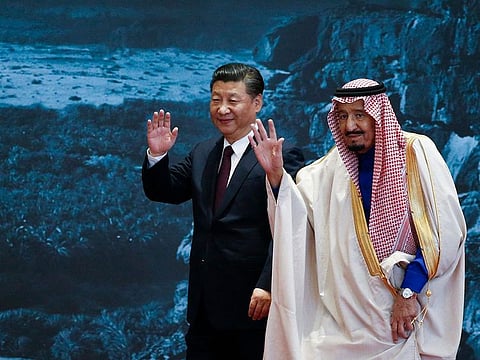Chinese President Xi Jinping begins Saudi visit to attend summits from Wednesday
China-Gulf summit and China-Arab summit to involve dozens of deals and MOUs

Riyadh: Saudi Arabia said Chinese President Xi Jinping will visit the kingdom from Wednesday for a summit that will showcase growing ties.
Crown Prince Mohammad bin Salman will take part in a Saudi-Chinese summit during Xi’s December 7-9 visit, the kingdom’s SPA state news agency said on Tuesday.
Xi’s bilateral summit, chaired by King Salman and attended by Crown Prince Mohammad bin Salman comes after the Chinese President secured a historic third term in November.
Xi’s visit reflects “much deeper relations developed in recent years” between the two countries, said Ali Shihabi, a Saudi analyst close to the government.
“As the largest importer of Saudi oil, China is a critically important partner and military relations have been developing strongly,” he said, adding that he expected “a number of agreements to be signed”.
Leaders from the six-nation Gulf Cooperation Council and other Arab states will also be present, it said.
Trade and investment ties between China and Gulf states are expected to feature prominently in Xi Jinping’s trip to Saudi Arabia this week as the region increasingly looks East to drive economic transformation at home for a post-oil era.
China, the world’s biggest energy consumer, is a major trade partner of Gulf oil and gas producers and while economic ties remain anchored by energy interests, bilateral relations have expanded under the region’s infrastructure and technology push.
Saudi Arabia is China’s top oil supplier, making up 18 per cent of China’s total crude oil purchases, and state-run Saudi Aramco has annual supply deals with half a dozen Chinese refiners.
Riyadh has said that strengthening trade ties and regional security would be priorities during Xi’s visit, during which the kingdom will host a China-Gulf summit and a China-Arab summit that diplomats say will involve dozens of agreements and MOUs.
Outside energy, Gulf Cooperation Council (GCC) states provide markets for Chinese goods, construction contracts and investment opportunities in infrastructure, manufacturing and digital economies that fit Beijing’s Belt and Road Initiative.
“The GCC wants FDI (foreign direct investment) which not only caters to local demand but also allows these economies to integrate into global supply chains,” said Fareed Mohamedi, managing director at SIA Energy International.
“The Chinese companies will help do that, first on an Asia regional level, then beyond.” Saudi Arabia, the world’s top crude exporter and largest Arab economy, aims to reduce reliance on oil by creating new industries that can generate jobs for Future technologies
Last visit in 2016
Xi last visited Saudi Arabia in 2016, the year before Prince Mohammad became first in line to the throne, on a trip that also featured stops in Egypt and Iran. Prince Mohammad visited China and met with Xi on an Asia tour in 2019, the year before the coronavirus pandemic took hold. This year, Prince Mohammad has already welcomed Britain’s then-prime minister Boris Johnson, French President Emmanuel Macron and US President Joe Biden, who greeted the crown prince with a fist bump in Jeddah.
Saudis, with the government driving projects as FDI lags.
Saudi Arabia and the UAE are also investing in future technologies as a pillar of economic diversification, which has gained impetus in a global transition away from fossil fuels.
Chinese tech giant Huawei - which has participated in building 5G networks in most Gulf states - is finalising a location for a new data centre in Saudi Arabia that would be the region’s second after Abu Dhabi, a senior regional executive told local media in August. Online giant Alibaba has partnered with STC Group for cloud services in Saudi Arabia.
Chinese firms are looking at construction in Saudi mega projects like the $500 billion NEOM zone, and opportunities in mining and manufacturing as the kingdom moves to build local content, including in nascent defence and automotive industries.
Gulf Arab officials have said that while Washington remains a key strategic partner, it is important for the region’s national economic and security interests to deepen ties with other partners, which have included both China and Russia.
GCC-China trade has doubled between 2010 and 2021, London-based think tank Asia House said in a report. However, discussions on a free trade deal have dragged since 2004 and sources say talk of an agreement in the near future appears premature.
Beijing’s primary motivation for greater cooperation with the Gulf remains embedded in its dependence on energy imports while Arab producers are still heavily reliant on hydrocarbon revenues to deliver on their diversification drive.
Russia, a member of the OPEC+ oil producer alliance alongside Saudi Arabia, has been increasing its sales volumes to China with discounted oil after facing Western sanctions over its invasion of Ukraine, which Moscow calls a “special military operation”.
Sign up for the Daily Briefing
Get the latest news and updates straight to your inbox



